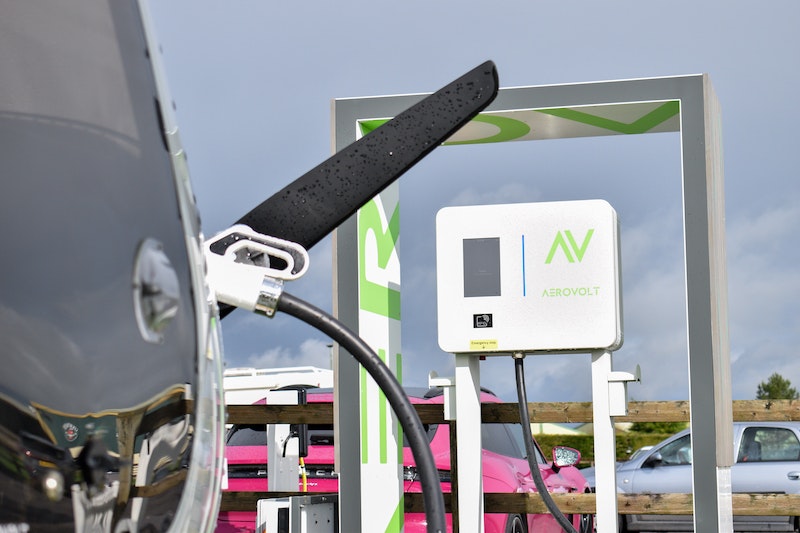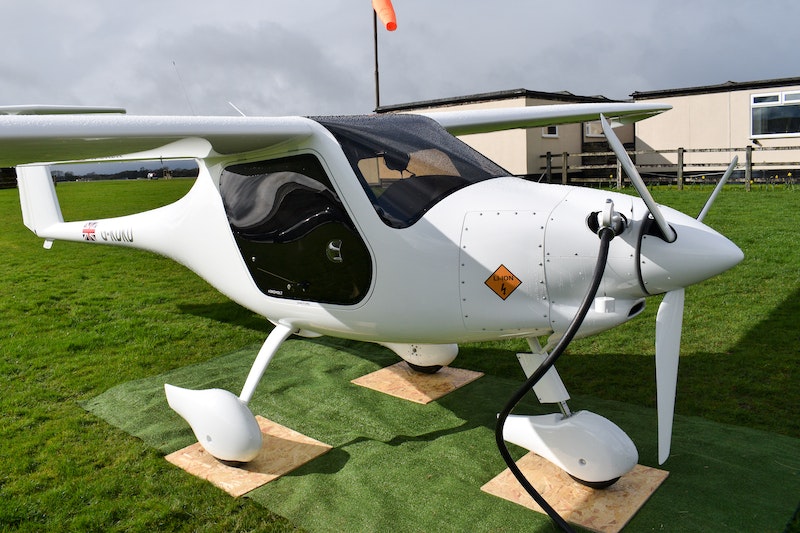Last month I gathered with several journalists at a rain-soaked Dunkeswell airfield in Devon as UK startup Aerovolt switched on what it says is the world’s first public charging network for electric planes.
It’s a three-hour train journey from London and, as a sweetener, we were promised a flight in the world’s only commercially available electric plane, Pipistrel’s Velis Electro.
Aerovolt was founded by twin brothers Alan and Phil Kingsley-Dobson in 2022 and is looking to preempt an airborne electric revolution that’s been seen on the roads in the past decade.
It has so far installed and connected charging points at six airfields in England — and the startup wants to install them at dozens more across the UK in the next 18 months.
The world’s first electric plane charging network
Electric vehicles (EVs) make up about 3% of all cars in the UK, and in 2023 more than 1m of them were registered in the UK — a mammoth hike on the 3.5k there were 10 years earlier. That growth has given rise to a huge — and increasingly well-funded — EV infrastructure sector in Europe.
Things have moved far slower in the skies.
The Velis Electro is one of just a handful of electric planes in operation today. Of the 19k privately owned planes registered in the UK, just 10 are electric, according to Aerovolt. It’s a tiny market, and you could be forgiven for thinking it’ll be years before companies begin to build the infrastructure around them. Aerovolt is trying to get ahead of that.

The Velis Electro is still where it was when I arrived — hooked up to Aerovolt’s branded charging point. The 22kW charging unit inside of it is supplied by aerospace power solutions company Eaton, which is available to anyone with £20k to spend. Aerovolt has also built an operating system that allows pilots to book and pay for charging slots.
A Velis Electro with a 20kW engine can be charged in 30 minutes for about £17 — and it promises to be cheaper than conventional flights, says Alan. A similar sized two-seater plane with a combustion engine would set a pilot back around £30-40 to fly for 75 miles, he adds.
It costs between £35-50k to install Aervolt’s charging points at airfields, which agree a lease of 15 years with the company and take a cut of the charging profits, says chief commercial officer Guy Haydon — the startup’s first and only non-family employee — as he shows me around the tiny Velis Electro.
It’s a pokey little thing — there’s just enough room for a pilot and passenger — with a very modest range of 75 miles.
It can’t fly in the rain, we’re warned, while we shelter from the elements in a cold gazebo. We’re told the weather might clear up a little later that afternoon. We hope.

The idea for Aerovolt came when Phil — who has a pilot’s licence — saw a charging unit wheeled out on a trolley to charge a Velis Electro, and realised no one had built an operating and payments system around that.
While a charging trolley might serve the handful of electric plane enthusiasts who’ve forked out £180k for a Velis Electro, if electric aviation takes off as Phil and Alan hope, proper infrastructure will be needed.
The lack of it has held back the green transition on the roads. As electric car numbers have grown on the roads in recent years, patchy charging station coverage has put off mainstream buyers.
Aerovolt’s six charging points have recently gone live on Octopus Energy’s Electroverse EV network app — which allows EV owners to locate available charging points. Unsurprisingly, they’re the only ones for electric aircraft on the app.
That said, investors have still shown interest in the company. It raised £400k from 7percent Ventures at the start of last year and is raising another £3.5m — which it hopes to close by mid-April.
The future of flying?
There are signs electric aviation could be on the up.
Avgas — a fuel made from tetraethyl lead that most small conventional aircraft use — is set to be banned in Europe and the US by 2027 due to concerns about harmful emissions, and there are growing calls for the UK to follow suit.
Several new small electric plane models — like the Diamond eDA40 and the Bristell Energic — will also join the Velis Electro in the growing fleet of commercially available electric aircraft over the next couple of years.

Startups are moving onto the scene, too. Last month, Sweden’s Heart Aerospace, which is building a 30-seater plane with a 200-mile range, raised $107m from investors including Bill Gates and could hit the market by 2028. The Netherlands’ Elysian Aircraft picked up $10m in January to develop its concept for a 90-seater electric plane that could travel 500 miles.
Getting the power from the grid needed to charge electric planes as they get bigger could be a challenge, though — and it’s the main barrier to the suitability of an airfield to host Aerovolt’s charging points, says Haydon.
Of the 70 airfields Aervolt is targeting over the coming 18 months, 15-20% of them will need some sort of energy storage system. This includes Dunkeswell, where Aerovolt has installed UK startup Allye’s battery storage unit — which it makes by repurposing old Tesla batteries — to bolster the weedy connection to the grid.
And it’s not just electric planes that Aerovolt sees its future in — there are also electric vertical take-off and landing (eVTOL) aircraft and large electric drones. The startup recently signed an agreement with Snowdonia Aerospace Centre — which is a testing facility for both kinds of tech — to provide it with charging ports.
Grounded
But for the next few years, the startup will be focused on getting more airfields to agree to install charging points.
For most, Aerovolt signs exclusive deals to be an airfield’s sole charging point provider. “Ultimately the goal is to knock out the competition,” says Alan. Of the 900 airfields in the UK, he thinks half could eventually have an electric plane charging point.
The startup will use the cash from its ongoing fundraise to build up its presence in the country, before expanding to Europe. It’ll be “three or four years” until the company sees “significant revenue”, he tells Sifted. “But that’s [the case] with any new technology and getting in there first.”
Aerovolt has agreements to install its charging points at 20 more airfields across England, Scotland and Wales and hopes to have 40 up and running by the middle of 2025.
Its six airfields so far are all on the south coast — a piece of which we’re told we will get to see from the skies not long after the rain stops, and I’m ushered out to the Velis Electro to wait for founder and pilot Phil.
He returns from the air traffic control centre on the airfield with a glum expression on his face. The cloud is too low — we’re grounded.
We settle for driving up and down the runway a couple of times in the plane, donning headsets to block out the deafening sound of the engine. I’m told avgas-fuelled two-seaters are louder, but the Velis Electro is a far cry from the muted whirring of an electric car.
It’s not the ending I hoped for — but it might be reflective of the electric aviation industry Aerovolt is trying to tap into. There’s lots of promise, but it’s yet to take off.


